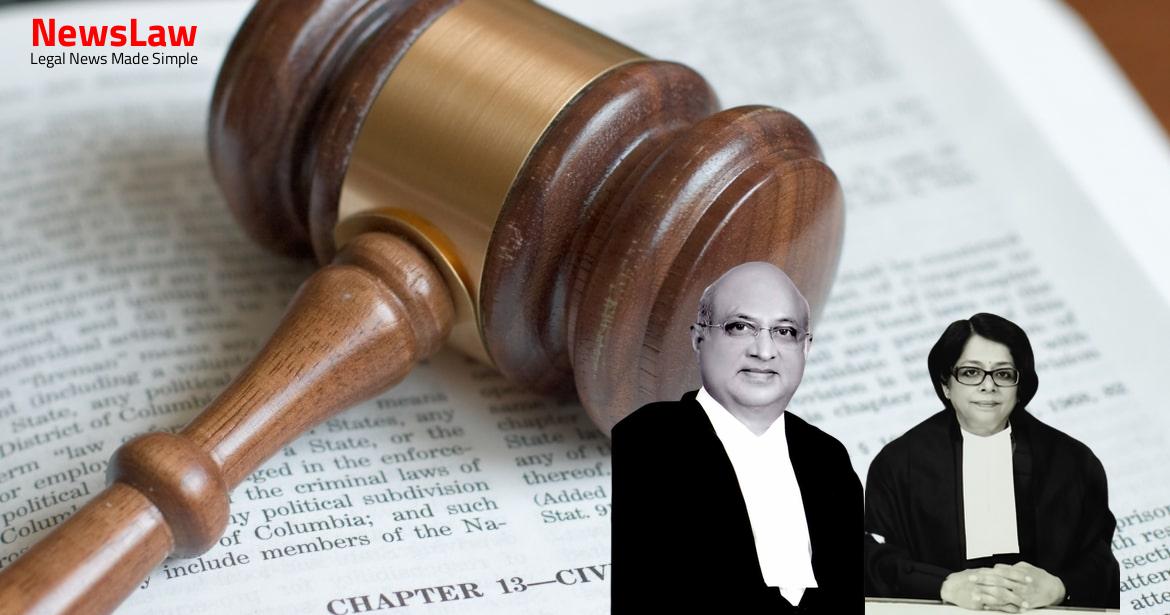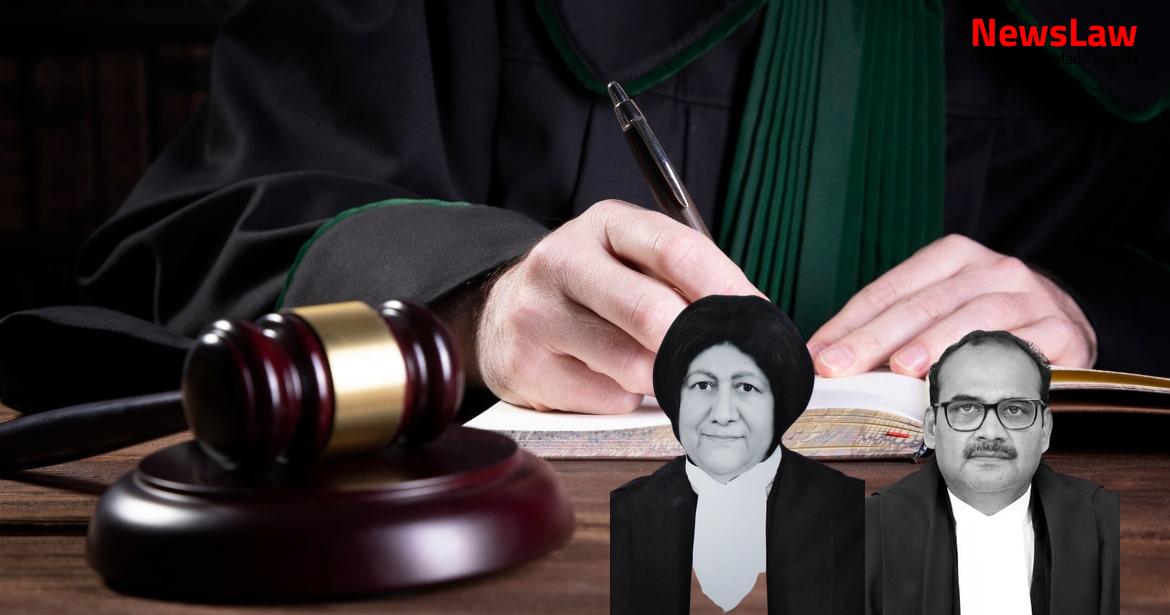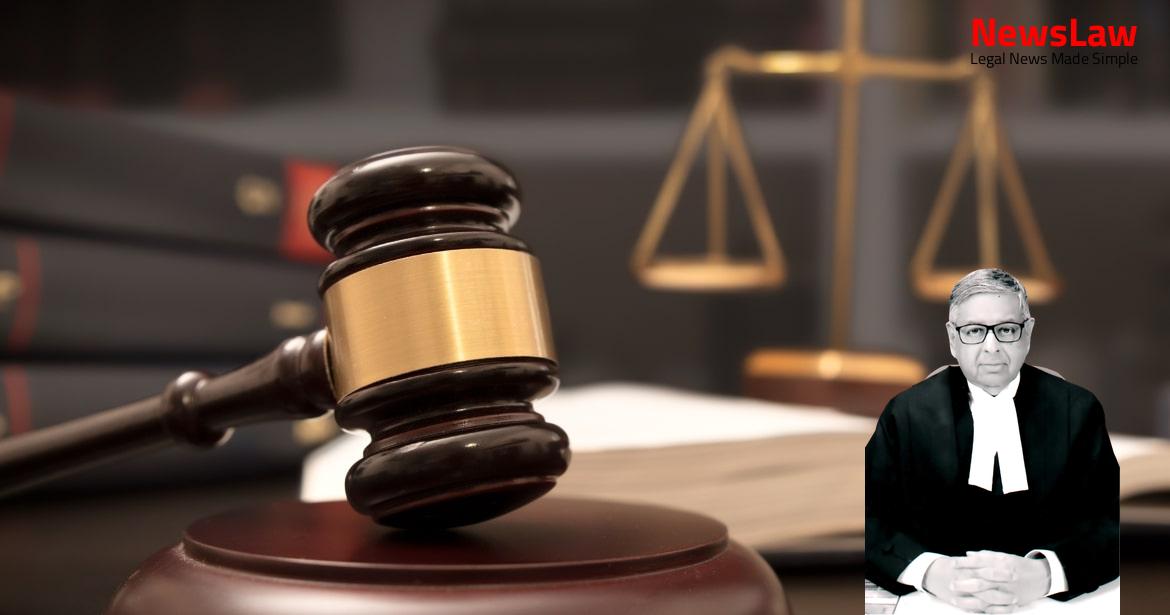In a momentous ruling, the Supreme Court of India has resolved a dispute over the ownership of property between Mr. X and Mr. Y. The judgment declares the property as coparcenary and invalidates the Sale Deeds in question. Get insights into this crucial legal battle and its implications on property rights. #SupremeCourt #LegalCase #PropertyRights #Coparcenary #SaleDeeds
Facts
- Dharam Singh admitted that no money was paid by Harpal Kaur for the suit property.
- The Appellant was granted joint possession of the suit property with his father.
- The suit property was not coparcenary property at the time of the sale deeds in 1999.
- The Sale Deeds were executed without monetary consideration as a condition for marriage.
- The Sale Deeds executed in favor of Harpal Kaur were deemed illegal, null, and void by the Collector.
- The Civil Suit was filed to declare the suit property as coparcenary and the sale deeds as invalid.
- Dharam Singh admitted no consideration was exchanged for the sale deeds.
- The marriage between Dharam Singh and Harpal Kaur ended in divorce.
- The sons later transferred one-fourth share of the property back to their father for his sustenance.
- The High Court allowed the RSA filed by the Respondents and set aside the concurrent findings of the lower courts.
- During the pendency of the Regular Second Appeal, Dharam Singh passed away.
- The High Court ruled that the Appellant lacked locus standi to bring the Suit as the coparcenary property had ceased to exist after partition in 1964.
- Appellant had no right to challenge the Sale Deeds of 01.09.1999 on the grounds of unpaid consideration.
- Jamabandis for the years 1957-58 till 1970-71 were not produced by the Appellant.
- The Appellant argues that the suit property was coparcenary property where he had a birthright as a coparcener.
- Sale Deeds of 01.09.1999 were executed without consideration as per admission by Dharam Singh and Respondent No 1.
- The Sale Deeds were deemed illegal, null, and void due to no legal necessity or benefit to the joint family estate.
- Respondent Nos. 1, 2 & 3 filed RSA No 1354 of 2014 against the Order.
- The ADJ dismissed the Appeal on 13.01.2014.
Also Read: Supreme Court Judgement: High Court’s Order Upheld in Case of [Respondent] v. [Petitioner]
Issue
- The issues before the court are whether the suit property was coparcenary property or self-acquired property of Dharam Singh.
- Another issue is the validity of the Sale Deeds executed on 01.09.1999 by Dharam Singh in favor of Mr. X.
- The subsequent Sale Deed dated 30.10.2007 executed by Mr. X in favor of Mr. Y and Mr. Z is also under question.
- Determining whether the suit property was inherited or self-acquired by Dharam Singh is crucial in deciding the validity of the transactions.
Also Read: Enhancement of Compensation Awarded in Motor Vehicle Accident Case: Supreme Court’s Judgment
Analysis
- Under Hindu Law, when a son is born, he automatically gets a share in the father’s property and becomes part of the coparcenary.
- Legal necessity must be established by the alienees to support a sale of property.
- After the Hindu Succession Act, when a son inherits property under Section 8, it is not considered as part of his undivided family but as his individual property.
- Upon partition, coparcenary is dissolved, and the separated members hold their respective shares as separate property passing on to their heirs upon death.
- A share acquired on partition of ancestral property remains ancestral property in regards to the male descendants who acquire an interest in it by birth.
- The power of a Karta to sell coparcenary property is subject to restrictions like legal necessity or benefit of the estate, with the onus on the alienee to prove the necessity.
- The joint family property governed by the Mitakshara School ceases to be joint family property after distribution under section 8 of the Hindu Succession Act, with the successors holding it as tenants in common.
- The succession opened in 1951 upon the death of Lal Singh, governed by the old Hindu Mitakshara law.
- Sale Deeds dated 01.09.1999 executed by Dharam Singh were deemed invalid as the property was not his self-acquired property.
- Legal necessity must be proven by the alienee and in this case, it was not established by Sarala.
- After partition, property in the hands of the son remained as coparcenary property, allowing the sons to have a share in it by survivorship.
- The nature of property inherited from paternal ancestors under Mitakshara law remains coparcenary property, even after the Hindu Succession Act of 1956 came into effect.
- Inder Singh’s sons continued to hold the property as coparcenary, with their male descendants entitled to it.
- The Sale Deed executed by Sarala in 2007 was considered null and void due to the doctrine of lis pendens.
- The burden of proof regarding legal necessity or benefit to the estate was not discharged by Sarala, making the Sale Deeds invalid.
- The property allotted to Dharam Singh in partition remained coparcenary property, affecting the Appellant’s share as a coparcener.
- Under Mitakshara law, a son, grandson (whose father is deceased), and great-grandson (both father and grandfather deceased) succeed simultaneously as a single heir to the separate or self-acquired property of the deceased with rights of survivorship.
- Any property inherited by a male Hindu from his father, father’s father, or father’s father’s father is considered ancestral property.
- The Appellant had the locus to file a Suit for Declaration regarding the sale of coparcenary property by his father Dharam Singh without legal necessity or for the benefit of the estate.
- The Sale Deeds dated 01.09.1999 executed by Dharam Singh in favor of Respondent No 1 were declared illegal, null, and void.
- The lack of consideration in the Sale Deeds indicates the sale was without legal necessity as coparcenary property cannot be sold without legal necessity or for the benefit of the estate.
Also Read: Case on Constitutional Validity of Section 35AC with High Court Dismissal
Decision
- Judgment of the learned Single Judge set aside as contrary to law
- Non-production of Jamabandis deemed irrelevant as it did not impact ownership of the property
- Appellant to be recorded as the owner of the suit property in Jamabandis
- All pending Applications disposed of
- Civil Appeal allowed
- Subsequent Sale Deed dated 30.10.2007 cancelled and set aside as illegal
- Sale Deeds dated 01.09.1999 in favor of Dharam Singh cancelled and set aside
Case Title: ARSHNOOR SINGH Vs. HARPAL KAUR
Case Number: C.A. No.-005124-005124 / 2019



